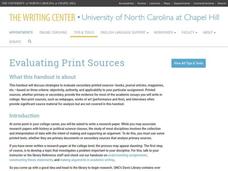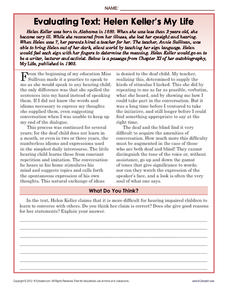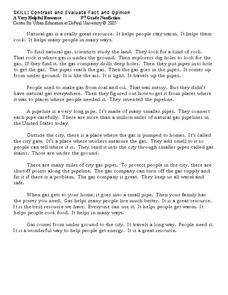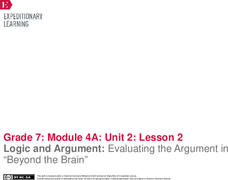University of North Carolina
Evaluating Print Sources
Not all sources are created equal, so how do you evaluate them? Writers learn how to evaluate print sources based on elements such as audience, tone, and argument in the sixth handout of 24 in the Writing the Paper series from the...
Ontario
Reading Informational Text
Learning to recognize the importance of the features of information text (i.e., titles, subtitles, endnotes, sidebars, etc.) is the focus of a reading activity designed for middle schoolers. Learners examine how these text features help...
K12 Reader
Evaluating Text: Helen Keller's "My Life"
Readers are asked to evaluate Helen Keller's claim, and the evidence she uses to support her argument, that it is more difficult for hearing impaired children to learn to talk with others.
Florida Center for Reading Research
Fluency, Connected Text, Partner Reading
This lesson plan pairs high and low leveled readers together to make partner reading beneficial for both. Learners read a selected text as a team, when the lower leveled reader is stuck, his partner is there to help him out. And by...
Florida Center for Reading Research
Fluency: Connected Text, Choral Reading
Set up beginning readers into choral reading groups to aid with fluency. Scholars each have a copy of the text, and one begins reading as the rest of the group choral reads along. They each take a turn being the first reader, allowing...
Florida Center for Reading Research
Fluency: Connected Text, Rereading Decodable Text
Using a familiar decodable text, pairs take turns reading sentences. The partner who isn't reading follows along silently, helping if needed. They alternate sentences until the entire book is finished and then reverse to read the other...
EngageNY
Evaluating an Argument in The Big Thirst
Don't argue with me! Scholars first evaluate the argument in The Big Thirst. Learners work with partners to determine if the text supplies enough evidence to support the claim. They then complete a Tracing an Argument Note catcher for...
Florida Center for Reading Research
Fluency: Connected Text, Practice and Read
A reading activity boosts scholars' level of fluency while reading connected text. Working collaboratively, pairs read a word list three times and a specific text while their partner gauges their accuracy and speed.
EngageNY
Identifying How Text Features Support Arguments: “The Exterminator"
Half and half. Split the class in half to gain a full understanding of sidebars. Pupils work in groups to discuss sidebars in text. Half of the groups read Seriously Sick, and the other half reads Killer Genes. They read using...
Education Bureau of Hong Kong
Evaluating Casual Claims
Responsible decision making relies on the ability to a recognize, analyze, and evaluate claims. The worksheets and activities in this 32-page packet teach learners how to distinguish among opinions, reasoned arguments, facts, and logical...
DePaul University
Contrast and Evaluate Fact and Opinion
Looking for a resource that helps learners practice identifying fact and opinion? A four-page worksheet includes two informational text reading passages. Pupils read each passage and respond to four multiple choice and one short answer...
Curated OER
Advertising in the Contemporary World: An Introduction to Persuasive Texts
Beginning a persuasive writing unit with your middle schoolers? Approach it through something that persuades us all: advertising! Through studying video and print advertisement, your class will practice Common Core skills for reading...
EngageNY
Mid-Unit Assessment, Part II: Research Task: Comparing and Contrasting Texts
When it comes to comparing texts, it's apples to oranges. As part two of the mid-unit assessment, learners compare and contrast two texts about the Internet and brain health. While reading, scholars use a Venn diagram to compare two...
Curated OER
Research Skills: Information Retrieval and Evaluation
Focus on research skills, specifically identifying key words and concepts on a specific topic and evaluating information for relevance and authority. This is part of a multi-step lesson on Ancient Rome; however, it is useful for any...
Curated OER
Research Skills: Evaluating Information and Sources
While this focuses on Ancient Rome, the objectives are improved research and information evaluation skills. In one class period, class members narrow their topic, research it, select the best information, log useful sources, and discuss...
EngageNY
Tracing and Evaluating Arguments: “The Future of Water” and The Big Thirst
Can scholars predict the future? They try as they first watch the video The Future of Water to capture details and trace the argument. Next, individuals complete the Tracing an Argument
note catcher to guide their thoughts. To finish,...
Curated OER
Search Warranted?
Young readers work on evaluating claims in a piece of informational text with the article "In New York, It's Open Bag or Find Exits" from the New York Times. They analyze current search procedures implemented to fight terrorism and...
EngageNY
Annotating the Text and Identifying Argument, Claims, and Evidence: “Double Whammy” Excerpt from “The Exterminator"
That's a double whammy! Scholars read the excerpt Double Whammy from The Exterminator. After identifying the gist of the text, they annotate by marking the author's claim. The group discusses what is meant by double whammy and complete...
Fluence Learning
Writing Informative Text: Did Shakespeare Write Shakespeare?
William Shakespeare penned some of the richest and most fascinating works of literature—or did he? Middle schoolers read three brief informative passages and conduct additional research to evaluate the claim that Shakespeare did not...
College Board
Evaluating Sources: How Credible Are They?
How can learners evaluate research sources for authority, accuracy, and credibility? By completing readings, discussions, and graphic organizers, scholars learn how to properly evaluate sources to find credible information. Additionally,...
Florida Center for Reading Research
Comprehension: Text Analysis, Fiction and Nonfiction Find
Scholars analyze fiction and nonfiction text and fill in a worksheet detailing the text's title, genre, and reason for its classification.
EngageNY
Logic and Argument: Evaluating the Argument in “Beyond the Brain”
The brain is not the mind. Scholars explore the claim by reading an informational article about neuroscience research, "Beyond the Brain." As they read, they answer text-dependent questions and complete an anchor chart to evaluate...
EngageNY
Evaluating an Argument: “Is Google Making Us Stupid?”
Does the Internet negatively affect peoples' brains? Scholars complete a Tracing an Argument note catcher to evaluate the question as they read the text "Is Google Making Us Stupid?" Exploring both sides of the issue, they add their...
EngageNY
Mid-Unit Assessment, Part 1: Tracing and Evaluating Arguments
It's test time! As part one of the mid-unit assessment, scholars complete a Tracing an Argument note-catcher for both a text and a video about the Internet's effect on the brain. Pupils demonstrate learning by evaluating the argument and...
Other popular searches
- Evaluating Text Features
- Evaluating Text in Stories
- Evaluating Text Lesson Plans
- Evaluating Text Checklist

























